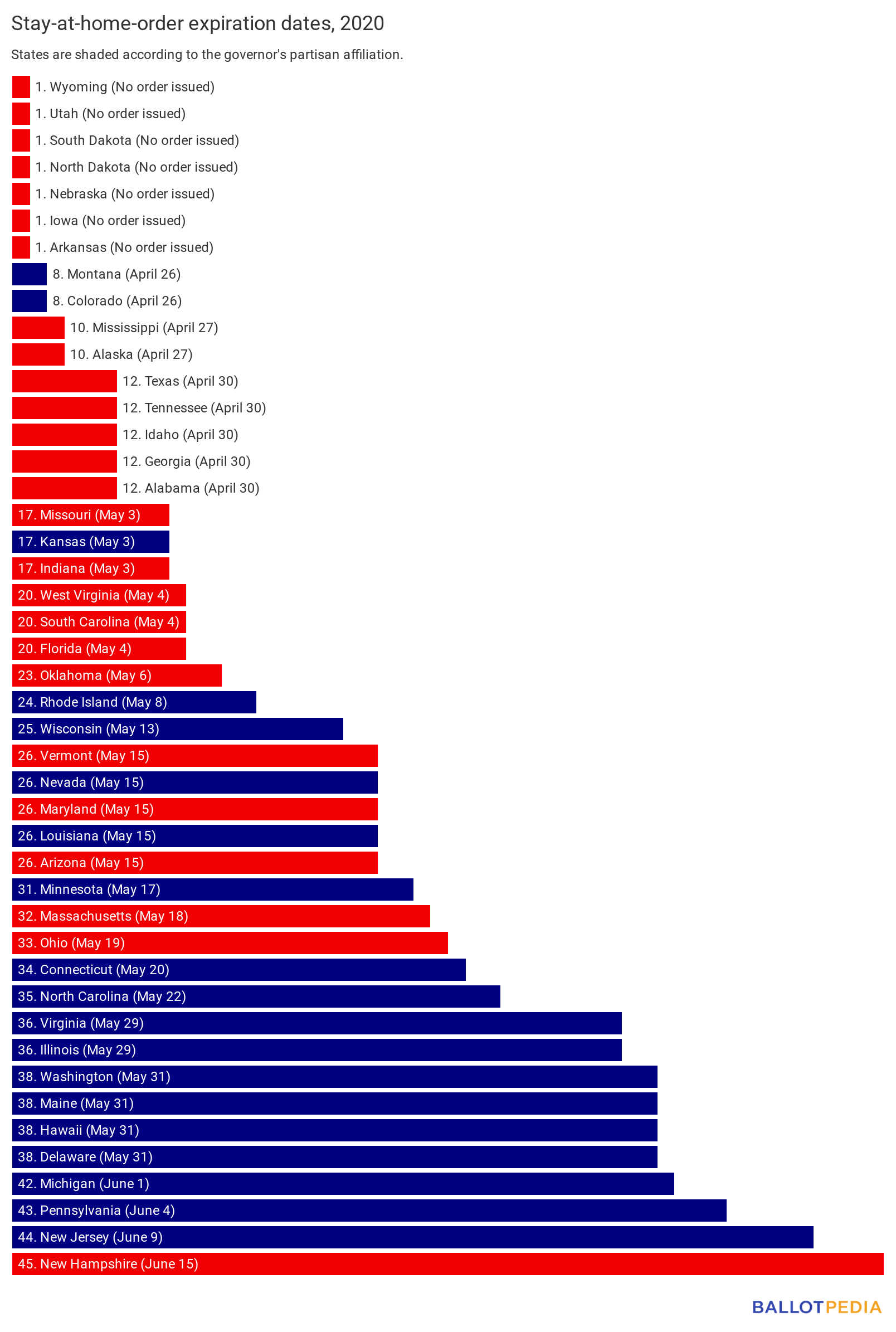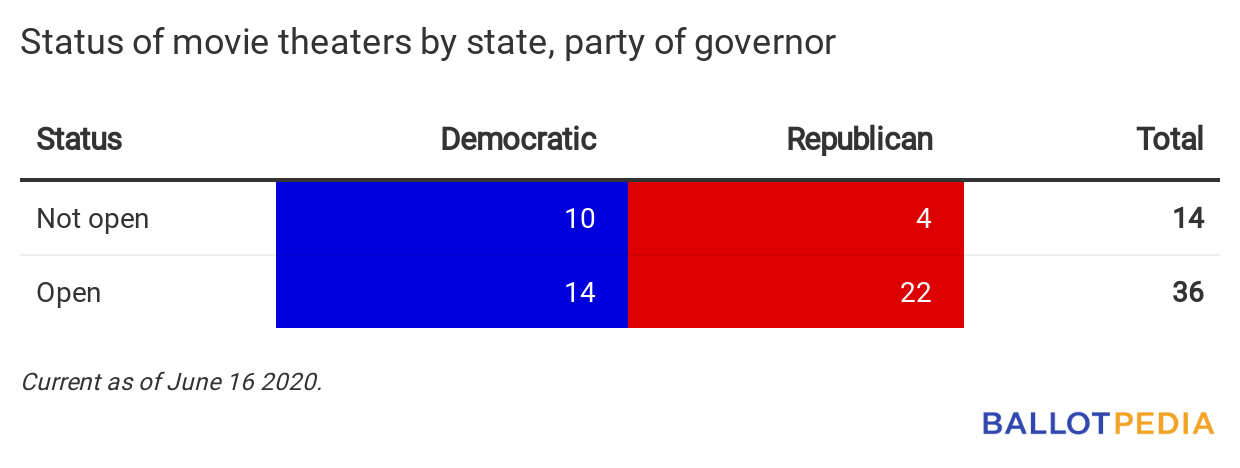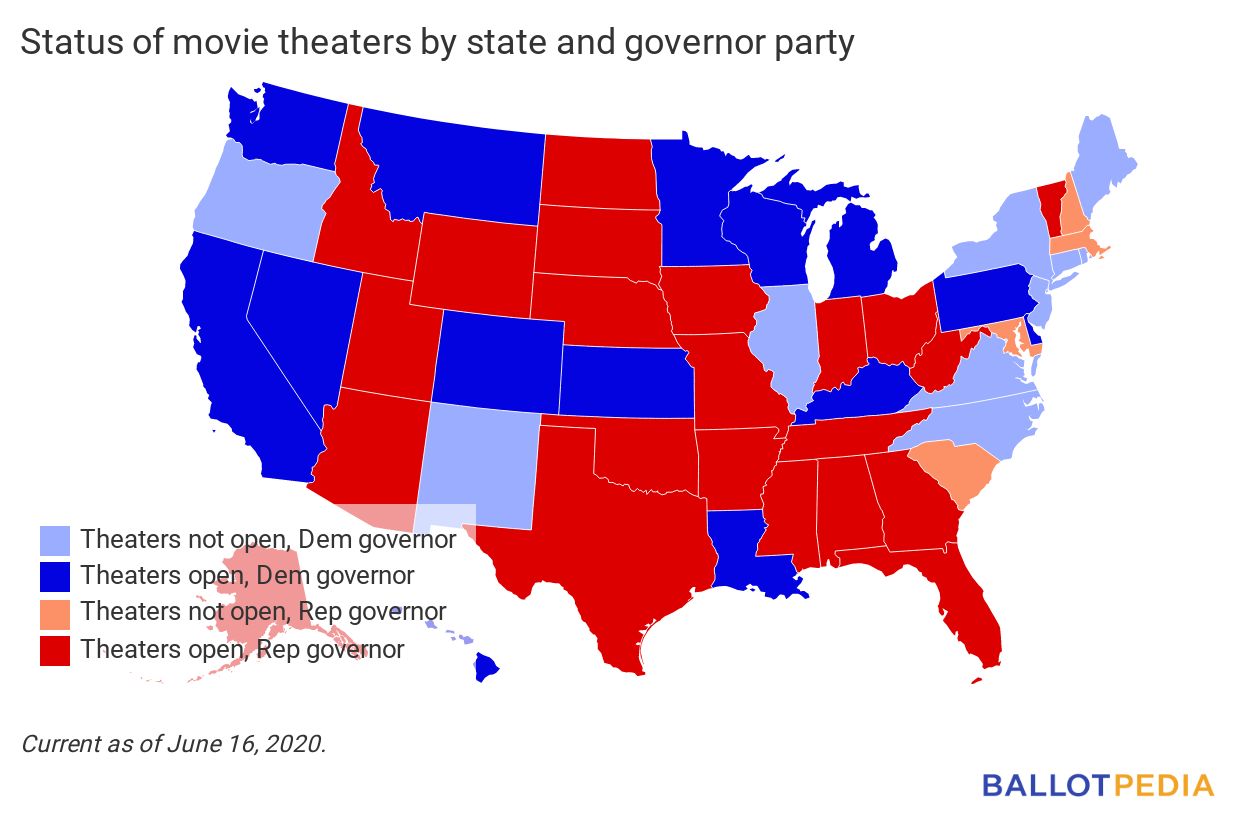Each day, we:
- Track the status of reopening in all 50 states.
- Compare the status of one industry or activity across the country.
- Provide in-depth summaries of the latest reopening plans.
- Give you the latest stories on other reopening plans and ideas.
Want to know what happened Monday? Click here.
The next two days
What is reopening in the next two days? Which stay-at-home orders will expire?
June 17
- Maine (Democratic trifecta): On June 15, Gov. Janet Mills (D) announced that dine-in service at restaurants in Androscoggin, Cumberland, and York counties could resume, effective June 17. The following businesses and activities will also be allowed to reopen or resume in those three counties on June 17: tasting rooms and bars (outside service); gyms and fitness centers; nail salons; tattoo and piercing parlors. These businesses and activities have already resumed in the state's other 13 counties.
- New York (Democratic trifecta): The Capital region will become the seventh of 10 regions to enter Phase 3 of the state's reopening plan. Western New York entered that phase on June 16. Under Phase 3, in-restaurant dining and personal care services such as tattoo parlors may resume, both at 50% capacity. Gatherings of up to 25 are allowed. Gov. Andrew Cuomo (D) announced that hospitals and group homes could begin accepting visitors by the end of the week if the facilities follow state guidelines. He also announced that the U.S. Open would be held in August without fans.
Since our last edition
What is open in each state? For a continually updated article on reopening status in all 50 states, click here. For our last edition, click here.
- Colorado (Democratic trifecta): Gov. Jared Polis (D) announced draft plans for continuing the state’s reopening. The draft includes indoor events for up to 100 people, outdoor events, bars reopening at 25% capacity, and expansion of personal services that require customers to remove masks. Polis also said some areas of the state were reaching a point that would allow local health departments to make reopening decisions rather than the state.
- Missouri (Republican trifecta): The state is entering the second phase of reopening on June 16. Phase Two completely lifts statewide restrictions and health orders. Local officials can still implement more stringent regulations.
- Nebraska (Republican trifecta): Gov Pete Ricketts (R) announced that 89 of 93 counties would move into Phase 3 of his reopening plan on June 22. The following businesses and activities will be permitted to resume: bars and restaurants (100% occupancy with social distancing measures); gyms and fitness facilities (75% occupancy); personal care services (75% occupancy); wedding and funeral receptions. Under Phase III, indoor gatherings will be limited to 50% occupancy with no more than 10,000 people, and outdoor gatherings will be limited to 75% occupancy with no more than 10,000 people. Childcare facilities can reopen with the following limits: infants to 3 years old (15 children per room); 3-year-olds (20 children per room), 4-5-year-olds (24 children per room); and school-age children (30 children per room). Contact sports, like football and basketball, are permitted to resume practice and play games on July 1. The remaining counties— Dakota, Hall, Hamilton, and Merrick—will enter Phase 2 on June 22. Under that phase, bars and strip clubs can reopen at 50% capacity, host parties up to six people, and patrons are required to stay six feet away from entertainers. Games, such as darts and pool, are prohibited. Gatherings of up to 25 or 25% capacity (excluding staff) for indoor or outdoor attractions, such as arenas, fairgrounds, libraries, or any other confined indoor or outdoor space are allowed in Phase 2. For larger venues, no more than 3,000 people are allowed, even if that number is less than 25% occupancy. Weddings and funerals can also resume, limited to up to 25 people or 50% occupancy, excluding staff. Phase 2 allows limited, noncontact sports, such as baseball and softball, to resume practices. Games are allowed to resume on June 18. Basketball, tackle football, soccer, and wrestling remain prohibited in Phase 2. Ricketts also announced that elective surgeries are allowed in all counties.
- Nevada (Democratic trifecta): Gov. Steve Sisolak (D) announced the state is not ready to move into Phase 3 of his reopening plan, citing a 3-week upward trend in the number of new coronavirus cases. At a news conference on June 15, Sisolak said, “We have the expectation that as a result of reopening and an increase in testing, our positive cases were likely to increase and we have seen a rise in positive cases, but that has yet to negatively affect the capacity of our hospitals.” Sisolak had said he would wait two to three weeks after the state moved into Phase 2 of reopening to assess whether to move into Phase 3.
- New Jersey (Democratic trifecta): The New Jersey Department of Health issued guidance for outdoor organized sports on June 15. Guidance allows practices and competition for low-contact sports like golf and tennis. It allows modified, no contact practices for medium contact sports like baseball and high contact sports like football to resume on June 22. Medium contact sports are expected to resume traditional practices and games on July 6. High contact sports practices and games are expected to resume on July 20. On June 15, Gov. Phil Murphy (D) announced the state could move into Stage 3 of his reopening plan in a matter of weeks. Stage 3 would allow indoor dining, and bars and entertainment to reopen with restrictions. There is currently no date set for Stage 3.
- North Carolina (divided government): On June 15, Gov Roy Cooper (D) said he would announce whether more businesses would be allowed to open under his reopening plan early next week. The state is currently in Phase 2, which is expected to continue through June 26. Bars, movie theaters, and gyms remain closed but are expected to reopen when the state moves into Phase 3.
- Oregon (Democratic trifecta): The Oregon Supreme Court upheld Gov. Kate Brown’s (D) lockdown orders. The decision overturned Baker County Circuit Judge Matt Shirtcliff’s ruling, which blocked the enforcement of the executive orders issued in response to the coronavirus pandemic.
- Tennessee (Republican trifecta): Gov. Bill Lee (R) signed an executive order allowing nursing homes may accept visitors on a limited basis beginning June 15. Facilities can only reopen if all staff and residents have been tested at least once and there have been no new coronavirus cases in the previous 28 days.
- Wyoming (Republican trifecta): On June 15, Gov. Mark Gordon (R) eased restrictions on public gatherings, permitting up to 50 people to gather in a confined space with no restrictions and up to 250 people at indoor events with social distancing. The new order is effective through June 30.
Update on stay-at-home orders
Forty-three states issued orders directing residents to stay home except for essential activities and the closure or curtailment of businesses each state deemed nonessential. Seven states did not.
As of June 16, stay-at-home orders have ended in 38 states. Nineteen of those states have Republican governors and 19 have Democratic governors (including Wisconsin, where the state Supreme Court invalidated the stay-at-home order).
The five states with active stay-at-home orders have Democratic governors. They are (with expiration date):
- New York (June 27)
- New Mexico (June 30)
- California (no set expiration date)
- Kentucky (no set expiration date)
- Oregon (no set expiration date)
Here's which stay-at-home orders have expired.

Tracking industries: Movie theaters
All 50 states began to reopen in some way. Here, we give the status of one industry or activity across the states. Today’s question: in which states may you go see a movie in a theater? The chart and map below do not include states that only allow drive-in theaters.
 
The three companies with the most movie screens in North America as of July 2018 were AMC (8,218 screens), Regal (7,350), and Cinemark (4,544). Here’s where those companies stand on reopening.
- AMC: AMC announced on June 9 that it would open “almost all” of its locations in the United States in July. The chain said it was looking at adding high-tech vacuums, electrostatic sprayers, and upgraded ventilation systems to its theaters for sanitation.
- Regal: Cineworld Group, the owner of Regal Cinemas, announced on June 15 it would begin reopening theaters the week of June 22 and reopen all of its theaters by July 10. In a statement, the company said it was updating its booking system to enforce social distancing in theaters, changing screen times to help alleviate crowds, and updating cleaning procedures.
- Cinemark: CEO Mark Zoradi announced a four-phase reopening plan on June 3. Phase One, beginning June 19, is a five-theater test reopening in the Dallas-Fort Worth area. Phase Four, which includes all Cinemark theaters reopening, is scheduled for the weekend of July 10.
|

This is an in-depth summary of one of the latest reopening plans. Is there a plan you'd like us to feature? Reply to this email and let us know. Click a state below to read a previous Featured Plan.
North Carolina Gov. Roy Cooper (D) announced a three-phase reopening plan on April 23. The first phase of the plan began on May 8, allowing individuals to leave the house for commercial activity, retail to open at 50% capacity, and state parks and trails to reopen. Gatherings were capped at 10 people.
On May 22, the state entered phase two and the stay-at-home order was lifted. As of June 16, the state remains in the second phase, which allows restaurants, personal care services (like barbershops and salons), in-person religious services, and public playgrounds to operate.
In a press release announcing the plan, Cooper said, “North Carolina cannot stay at home indefinitely. We have to get more people back to work. Right now, the decision to stay at home is based on the public health data and White House guidance. North Carolina needs more time to slow the spread of this virus before we can safely begin lifting restrictions. I know that this pandemic has made life difficult for many people in our state and I am focused on keeping our communities safe while planning to slowly lift restrictions to help cushion the blow to our economy.”
North Carolina’s plan allows local governments to impose stricter regulations as long as they do not restrain state or federal government operations. Localities cannot impose different regulations on the retail industry.
The state’s reopening is contingent on the following criteria:
- A flat or decreasing rate of COVID-Like Illness (CLI)
- A flat or decreasing rate of lab-confirmed coronavirus cases
- A flat or decreasing rate of positive tests
- A flat or decreasing rate of hospitalizations
- Increase in testing capacity
- Increase in tracing capacity
- Availability of personal protective equipment
Context
- North Carolina’s statewide stay-at-home order took effect on March 27 and expired on May 22.
- As of June 15, there had been 45,102 confirmed positive cases of COVID-19 in North Carolina and 1,118 confirmed deaths. A total of 638,479 residents had been tested, amounting to a positive test rate of 7.1%. As of July 2019, North Carolina's estimated population was 10.5 million. Per 100,000 residents, there have been 429.5 confirmed positives, 10.6 confirmed deaths, and 6,080.8 total tests.
- North Carolina has a divided government, with a Democratic governor and Republican majorities in both chambers of the state legislature.
Plan details
Phase 1
Individuals
- Stay-at-home order in effect. Individuals permitted to leave home for commercial activity not previously defined as essential.
- 10-person gathering limit.
- Parks open for groups under 10.
- Face masks encouraged.
Businesses
-
- Personal service businesses closed (including barbershops and salons).
- Entertainment facilities closed (including bowling alleys, theaters, and gyms).
- Open businesses subject to restrictions, including:
- Retailers required to limit occupancy to 50% and remind customers to stay 6 feet apart.
- Restaurants limited to take-out and delivery only.
Phase 2
Individuals (guidance)
- Stay-at-home order lifted.
- At-risk populations encouraged to stay home.
- Gatherings of 10 people indoors or 25 people outdoors allowed.
- In-person religious services permitted with limits.
- Public playgrounds reopen.
Businesses (guidance)
Guidance and requirements for open businesses are available here.
- Restaurants open for dine-in.
- Personal care services allowed to reopen.
- Child care and camps permitted to resume operations.
- Public pools open with restrictions.
- Entertainment businesses (like bars, bowling alleys, and theaters) remain closed.
Phase 3 (at least 4-6 weeks after Phase 2 began)
Specific guidance for Phase 3 has not been made available as of June 16. However, the following changes were outlined in the April 23 plan:
Individuals
- Looser recommendations for at-risk groups. Distancing and minimizing exposure still encouraged.
- Increased capacity at places of worship.
- Increased gathering size limits.
Businesses
- Increased capacity for previously opened businesses.
- Entertainment venues reopen.
Reactions
- After a Meredith College poll found support for Cooper’s reopening plan, the poll’s director, David McLennan, said, “Despite the claims of groups like ReOpenNC and President Trump about reopening the economy and getting back to normal, most North Carolinians are paying attention to public health professionals and seeing the impact of coronavirus firsthand. As such, they are very cautious about resuming pre-COVID-19 activities.”
- State Rep. Michael Wray said he supported Cooper’s plan. “You go to a grocery store now, you go to Walmart and Lowe’s and some people think it’s no big deal, but it’s going to be a big deal when your family gets it. We’ve got to support our businesses, but we also have to support our healthcare.”
- On May 26, Lt. Governor Dan Forrest (R) said, “What you're seeing from the average business folks out there is that politicians end up making these random selections of decisions that really impact their business, and they don't understand why. It's not based obviously on science and data. … Sometimes it seems like he wants to completely do away with the virus before we open things back up. That's obviously not realistic.”
- After the legislature passed a bill seeking to reopen gyms and allow bars to serve drinks outdoors on June 11, state Rep. Kyle Hall (R) criticized Cooper’s reopening plan, saying, “We need to reopen these businesses. We needed to do it now so that we can salvage what is left. We need to do it in a way that will safely protect the customers and the patrons of these businesses.”
Additional activity
In this section, we feature examples of activities by other federal, state, and local governments and influencers relevant to recovering from the pandemic.
- On June 15, Judge Abdul Kallon, of the United States District Court for the Northern District of Alabama, issued a preliminary injunction barring election officials from enforcing witness and photo ID requirements for select voters casting absentee ballots in the July 14 runoff elections. The waiver of the witness requirement applies to any voter who provides a written statement, signed under penalty of perjury, that he or she suffers from an underlying medical condition that places the individual at higher risk for contracting a severe case of COVID-19. The waiver of the photo ID requirement applies to any voter who is either over the age of 65 or disabled who signs a written statement to that effect. Kallon also prevented the state from enforcing its de facto prohibition against curbside voting.
- Miami Mayor Francis Suarez announced that the city would not move into its next phase of reopening because of rising coronavirus cases in the state.
- The Rock and Roll Hall of Fame in Cleveland, Ohio reopened on June 15 with limited capacity. Guests and staff are required to wear face masks.
|





